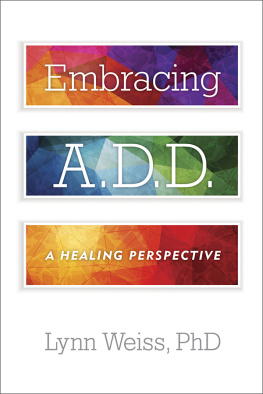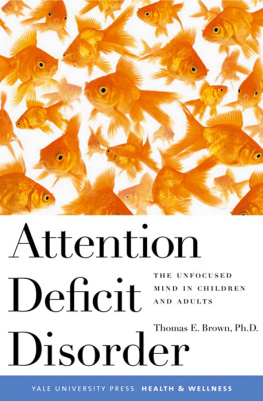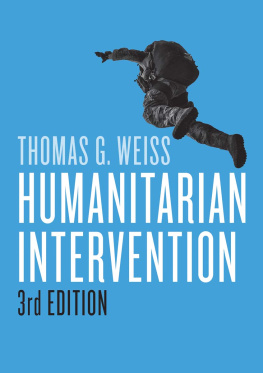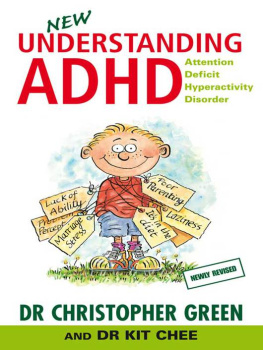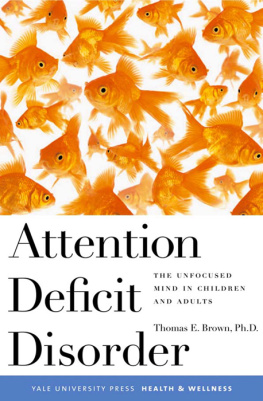
ATTENTION DEFICIT
DISORDER
IN ADULTS

Third, Revised Edition
Dr. Lynn Weiss
Foreword by
Kenneth A. Bonnet, Ph.D.

Also by Lynn Weiss
The Attention Deficit Disorder in Adults Workbook
ADD on the Job
Copyright 1992, 1997 by Lynn Weiss
All rights reserved.
No part of this book may be reproduced in any form or by any electronic or mechanical means, including information storage and retrieval systems, without written permission from the publisher, except by a reviewer who may quote passages in a review.
Published by Taylor Trade Publishing
An Imprint of the Rowman & Littlefield Publishing Group
4501 Forbes Blvd., Suite 200
Lanham, Maryland 20706
Distributed by National Book Network
Designed by Deborah Jackson-Jones
Library of Congress Cataloging-in-Publication Data
Weiss, Lynn.
Attention deficit disorder in adults / Lynn Weiss.
p. cm.
Includes bibliographical references.
ISBN 978-0-87833-979-2
1. Attention-deficit hyperactivity disorderPopular works.
2. Attention-deficit hyperactivity disorderAge Factors.
1. Title.
RJ506.H9W445 1991
Printed in the United States of America
Acknowledgments

A big special thanks goes to my son, Mendel, who initially brought ADD to my attention as an eight-year-old child. He taught me to parent differently, and he motivated me to find out all that I could about ADD so he could have a good life.
Thanks to Aaron, my older son, who became an advocate for his brother and helped us understand what its like to be a sibling of someone who has ADD attributes.
Dale Cheney, who helped with the writing of this project and who has become a good friend, deserves special acknowledgment. He learned more about ADD in adults than he may have ever dreamed existed and helped me arrange, condense, and write the many experiences that make up this book.
And thanks to Lora Cain, friend, colleague, and fan, who recognized that she had ADD from listening to me talk about it on the radio. Loras generous input enriched this book immeasurably.
It is with appreciation that I acknowledge Mary Kelly, my editor, from whom I continue to learn each time we work. Her belief in the subject made this book possible.
A great big hug and sweet smile to all the people who have touched my life who have ADD as adults. This book is for you.
Foreword

The symptoms of Attention Deficit Disorder are compromising to the individual, and to the family and persons who work with that person. Attention Deficit Disorder is also a problem to the professionals asked to deal with it, and to the professional committees asked to establish diagnostic definitions and criteria. A large number of professionals are pressed by the individual client to diagnose and treat the problem, but there is little professional training to deal with the realities of the disorders and symptoms that are collectively referred to as Attention Deficit Disorder or ADD or ADHD (Attention Deficit Hyperactive Disorder). The narrow focus so often brought to bear on the individual with symptoms is that it only occurs in males, that they will outgrow it, and that Ritalin is the treatment of choice if treatment is to be undertaken. Methods of dealing with such symptoms currently include time out, reprimanding, or stating that the individual with symptoms needs to learn to...; all are attempts to somehow coerce that person into compliance.
The majority of symptoms subsumed under the concept of Attention Deficit Disorder are approached in the medical, psychological, educational, and family arenas with a very minimum of information about attention, attention focus, its anatomy, its mechanisms, its brain biochemical regulation, and its interaction with environmental conditions. This minimal information is currently still reflected in nearly all aspects of the professional and parenting spheres, and more detailed information is often familiar only to the academician who has the least contact with the treatment or diagnosis of individuals with Attention Deficit Disorder.
Individuals with Attention Deficit Disorder may or may not also show hyperactive behaviors. They may or may not be male. Their disorder may or may not be evident to those around them. Some may simply miss bits and pieces of information presented to them that are assimilated in total by their peers in the same situation. The electrical, biochemical, anatomical, and developmental characteristics of the constellation of symptoms called Attention Deficit Disorder are now recognized as involving the central nervous system. An initiative developed by the Learning Disabilities Association of America resulted, two years later, in the report of the Interagency Committee on Learning Disabilities to the United States Congress in 1987. For the first time in federal language, the central nervous system is seen as having a major role in these symptoms.
The book you are about to read is for the nonprofessional individual. It is intended to provide the persons with ADD and those close to them with an understanding of the symptoms and their range and diversity. Dr. Lynn Weiss has accomplished this in an unusually effective manner. But she has also accomplished the accumulation of symptoms and means of dealing with them in a manner that can be very instructive to the professional who may otherwise rely on minimal information (unless he has personally lived with, or been very close to, an individual with Attention Deficit Disorder). Dr. Weiss provides personal vignettes that allow us to understand the daily manifestations and consequences of these symptoms. Reading these personal situations takes one far away from the simplistic views that an ADD person is a young boy running erratically around a classroom, symptomatic because he is allergic to one food chemical or another; that ADD is definitely/definitely not to be treated with Ritalin; and that ADD sufferers definitely outgrow their symptoms. These stereotypes slip away as one reads the professional and personal information throughout this book.
The reader quickly comes to realize the full consequences of problems with being able to maintain voluntarily focused attention on a task or situation in a systematic and sequential way. These problems with attention may or may not be made worse by certain chemicals or foodstuffs (individual sensitivities can be severe), and they may or may not be accompanied by other symptoms (including hyperactivity). For the professional, it becomes very clear that ADD/ADHD is not a singular disorder, and it does not fit existing diagnostic criteria in a large number of cases. We must begin to take each of these symptoms seriously in the perspective of small but compromising deficits in attentional mechanisms rather than labeling them with an acronym ADD that conjures up a reflexive and singular treatment choice.
This book should be required reading for families, friends, and individuals with Attention Deficit Disorder(s) who are inserted into the human functioning of personal space and workplace. It is also recommended as reading that may very well broaden the understanding for the caring medical, psychological, or other professional who has not had the experience of living with the full ramifications of this cluster of symptoms. In the end, the caring individual can improve his understanding of the person with symptoms and through understanding can reduce the stress he experiences in trying to interact with symptoms that are not easily grasped nor fully understood.
Next page



